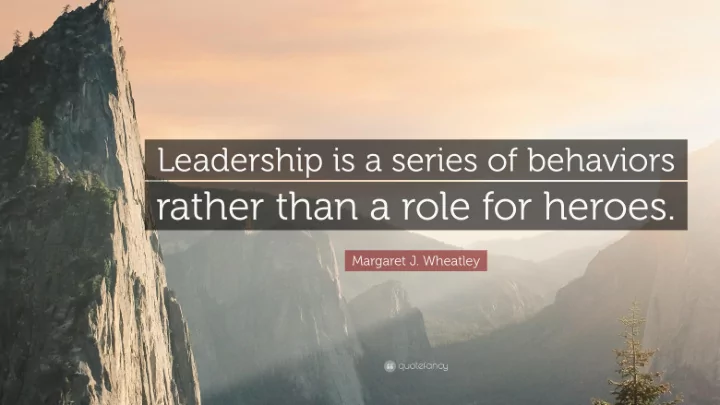

Wellbeing Strategies: Motivation and Resilience in Challenging Environments Rose Bryant-Smith, Worklogic page 02
Uncomfortable truths What got you here (voter/party support) won’t get you there (resilient, happy, ethical leadership) Being ‘right’ is not enough Being a leader is tough – You will be blamed and insulted Making difficult decisions and compromises is inevitable page 03
…but there is good news! Resilience can be learned Resources and help are available You have some control over each day Your can choose what sort of leader you are page 04
#1 Managing Conflict Reflection questions: Are there any situations that I struggle to deal with calmly and effectively? When people disagree, or the discussion becomes aggressive or blaming, how do I respond? page 05
Fight or flight: Amygdala Hijack page 06
Conflict: Reflection In what situations are you more likely to get emotional? page 07
page 08
Use empathy Emotional Intelligence: The ability to put oneself into the shoes of another person to understand their emotions and feelings. • Active listening • Reading people’s feelings and non -verbal cues • Being able to see things from other people’s perspectives, cultures and points of view • Understanding the underlying causes for other people’s feelings and behaviours page 09
Demonstrate curiosity • Keep an open mind • Avoid making assumptions about the other person’s motivation • Ask open questions: “Can you tell me more about that?” “How did you feel about that?” “Help me to understand…?” page 010
Remain calm Remain calm and impartial. Be open to the possibility that you can reach agreement, or at least reach an understanding of each other’s perspective Stay in your role. You are not their ‘friend’. They are not your ‘enemy’. Work collaboratively to generate options. page 011
Engage constructively Demonstrate you have listened : “Sounds like a tough situation” Encourage them to find solutions : “What action might you take to help turn that around?” Challenge unrealistic ideas : “I can’t see how that will be possible. Are there other solutions that you have considered?” Explain with non-personal reasons e.g. “Our policy requires…” page 012
Manage emotion If the other person gets emotional: See the emotion coming Acknowledge their emotion ‘Reframe’ what they are telling you (name the core issue) Identify the facts, emotions and values page 013
Be assertive with respect Always be respectful (even if they are not). Feel in control of yourself. Maintain good eye contact. Use communication which shows: - I cannot control others, but I control myself - I speak honestly and to the point - We are equally entitled to express ourselves - I may not agree with you, but I have understood and considered your perspective - I know the limits of my role page 014
#2 Being Present Reflection questions: In each interaction I have as a Councillor, am I truly present ? Do I consider, in advance, ‘how I will show up’? page 015
‘Be relentlessly present. Mindfulness is the only place to start.’
Being present Think ahead : Decide what to focus on, in the next 30 min / 3 hrs / 2 days… Pay attention to ‘the little things’ can be important cues Really listen Make time for others Observe what is going on (don’t immediately react) page 017
Minimise page distractions 018
#3 Managing your energy Reflection questions: Do I manage my energy over the course of the day? Do I make the time to recharge? How can I bring my best self to my leadership role, every day? page 019
Dr Wangari Maathai “Be the hummingbird”
Margaret Wheatley “Be a warrior for the human spirit”
Resilience: Reflection In your leadership role, how would it feel to know you are a ‘warrior for the human spirit’ ? How can you retain your sense of values-based leadership in the face of significant challenges? What do you need to believe? page 022
How you recharge , not how you endure! Research: Direct correlation between lack of recovery and health problems, as well as lost productivity. More time in the performance zone means you need more time in the recovery zone . page 023
How do you recharge? page 024
Downtime and self-care are necessary for high performance Physical exertion increases serotonin and improves mood and memory. Take time out. Give yourself ‘white space’ for reflection and creative thought. Consider trying meditation: • 5-10 minutes a day can be enough to feel the benefits • Headspace, Calm, Insight Timer (free) and Smiling Mind apps • There is no ‘failure’ in meditation. If you mind wanders, let the thought pass. page 025
#4 Walking the Talk: Values Reflection questions: When I am tested or put under real pressure, am I demonstrating moral courage and being true to the organisation’s values and my own values? Are there any bad habits or ‘below the line’ behaviours to which I fall prey, when I am under stress? page 026
page 027
Values: Reflection When have you felt the most proud, fulfilled and satisfied as a Councillor? What moments come to mind? What factors contributed to those feelings of pride, fulfilment and satisfaction? As a leader, what will you defend or fight for? page 028
Walking the Talk When have own values been put under pressure? ‘Nanny - cam’ view of how you act each day: would you be proud? Do you consistently act with integrity? page 029
Values guide our work and how we work
I can choose each day to demonstrate moral courage. I can choose each day to manage my energy and to recharge. I can choose to be the leader I want to be. page 031
Thank you Rose Bryant-Smith Director 0400 311 712 rbryantsmith@worklogic.com.au page 032
Recommend
More recommend